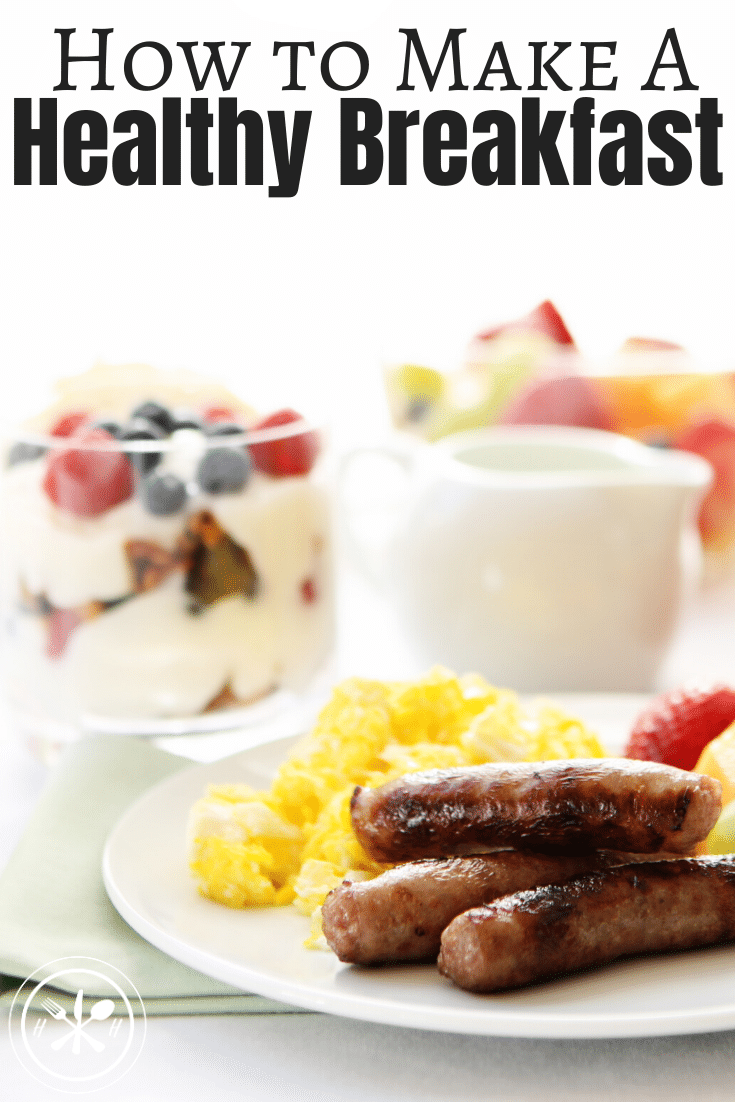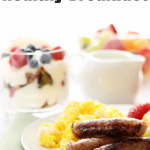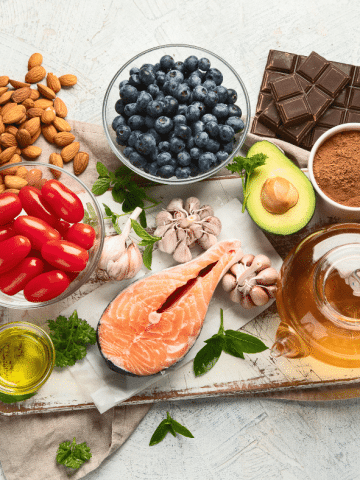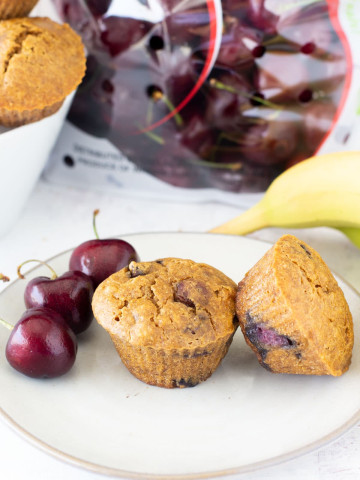You may have heard that breakfast is the most important meal of the day, but eating the wrong thing could be worse than not eating at all. Follow these tips to make your own healthy breakfast!

One mistake that I find my clients and students making over and over again is making a healthy breakfast without protein or healthy fat. I know I was guilty of this when I very first wanted to lose weight in college. I started eating a perfectly calorie counted breakfast of multi-grain cheerios, bananas, and non-fat milk.
In an attempt to eat a healthy breakfast, you too may gravitate toward items like oatmeal, fruit, and whole-wheat toast. While these are all great options as part of a healthy breakfast, eating them alone may be worse than not eating breakfast at all.
What? Fruit is worse than not eating breakfast at all?!?!?
Calm down. I didn't say fruit is bad for you. I said that fruit shouldn't be consumed by itself first thing in the morning. Don't take it out of context, and let me explain.
Breakfast means to "break" a fast. It's the first meal you eat after having fasted overnight while you were sleeping. If the first thing you put into your body is a whole bunch of sugar, then your blood sugar is going to spike.
At first, this will make you feel great, but it will quickly be followed by a blood sugar dip leading to fatigue, hunger, and cravings for more caffeine and sugar. If you are a coffee drinker, it should be noted that caffeine will cut your appetite, but that doesn't mean this isn't happening. It will catch up with you when the caffeine wears off, double hard.
How to Make A Healthy Breakfast
So, the name of the game for the first meal of the day is to create a slow and steady rise in blood sugar so that you have sustained energy all day. That means fewer hunger pains, cravings, and energy swings! How do you do that? Follow these three easy steps!
But first, if you are just looking for some healthy breakfast ideas (vs. how to build your own healthy breakfast), check out these 90+ Healthy Breakfast Recipes To Start Your Morning Off Right. Okay, now on to what makes a healthy breakfast actually healthy!
Get Enough Protein
Protein helps to slow down the blood sugar spike creating steady energy levels. It also triggers the release of satiety (fullness) hormones so you'll stay fuller for longer. I usually recommend a minimum of 15 grams of protein for females and 25 grams of protein for males at breakfast.
What are some protein options for a healthy breakfast?
Eggs
- Eggs have 6 grams of protein per egg, which is mostly in the egg white.
Don't just resort to egg whites, though! The yolk has essential nutrients such as omega-three fatty acids, antioxidants, vitamins, and minerals. You may want to do a mix of eggs and egg whites to get enough protein.
Uncured Breakfast Meats
- 1 cooked slice of bacon = 3 grams protein
- 1 cooked slice of turkey bacon = 5 grams protein
- 3-4 ounces cooked breakfast sausage = 10-15 grams protein
- 1 ounce smoked salmon = 5 grams protein
I wouldn't pick these every day due to the high sodium content. However, breakfast meats can be a great way to get in protein for breakfast. Some breakfast meats like bacon are higher in fat than protein, so you may have to combine them with other sources or use a turkey/chicken version to get enough protein.
Greek Yogurt & Cottage Cheese
- 1 cup plain Greek yogurt = 20-25 grams of protein
- ½ cup plain cottage cheese = 15 grams of protein
If you tolerate and like dairy, it can be a great way to get your protein for breakfast. Just watch the added sugar in your Greek Yogurt! Look for something with less than 15 grams of total sugar per cup. Or, even better, buy plain unsweetened versions and sweeten them yourself with fruit, honey, or maple syrup.
Tofu/Soy Products
- ½ cup tofu = 10 grams protein
- 3 ounces tempeh = 15 grams of protein
- 1 cup edamame = 17 grams of protein
Similarly, if you can tolerate soy or chose to consume it, it can be an excellent source of plant-based protein in the morning.
Protein Powders
- Usually, 18-30 grams per serving.
For the last couple of years, I've been having collagen powder in my coffee paired with a healthy carb/fat breakfast. I love this option because it allows me to get protein in, meanwhile still having my carbs! You can also have a protein shake or add protein to a smoothie or oats.
A similar option is powdered peanut butter, which has 8grams of protein per 2 tablespoons.
Need ideas on how to get enough protein?
- 12 High-Protein Breakfast Options For Vegetarians (No Eggs!)
- 5 Healthy High Protein Healthy Breakfast Options You Can Take On The Go
- 10 Portable Make-Ahead High Protein Breakfast Ideas
- 18 Unique and Delicious High-Protein Smoothies
- Smoothie Box Smoothie Kit Delivery Review (Comes with Collagen Powder!)
Include Some Fat
You also want to include some fat at your breakfast. Like protein, fat is filling and helps stabilize blood sugar, so you have steady energy levels and fewer cravings.
Where should your fat come from at breakfast? It depends on what you picked for your protein source. Some protein sources will include enough fat that you don't need to add any.
High Fat Protein Options
If you chose these, you don't need to add any additional fat to your breakfast.
- Whole Eggs
- Pork Breakfast Meats
- 2% or Whole-Milk Dairy Products
Low Fat Protein Options:
If you chose one of these, it's best to add a fat source to your breakfast.
- Egg whites
- Turkey/chicken breakfast meats (sometimes these are high fat, check the nutrition label)
- Non-fat dairy products
- Non-fat protein powders
What kind of fat should you add to a healthy breakfast?
- Nuts or nut butter (like almond, peanuts, etc.)
- Seeds or seed butter (like sunflower, tahini, chia seeds, flax seeds, etc.)
- Avocado
- Organic (ideally 100% grass-fed) cheese
See how to eat enough fat throughout the day for more ideas on how to include healthy fats throughout your day.
How much fat should you add to a healthy breakfast?
It depends on the rest of the meal and how many calories you wish your breakfast to be. I don't count calories, sometimes I count macros, but mostly I try to make sure the fat is there at breakfast.
Pick Your Carb Carefully
Do you need a starchy carb at breakfast? Maybe. Some situations which you may do better with carbs at breakfast are:
- You work out in the morning.
- You are within 20lbs or less of your goal weight.
- You are breastfeeding.
- You feel better with carbs at breakfast.
Not every meal needs to have starchy carbs, but we aren't pro keto over here either. Meaning, you don't need to eat low carb to have a healthy breakfast, and just because breakfast is low carb doesn't make it healthy. Low carb sometimes means low fiber, which is no Bueno.
Two things that are important when it comes to carbs at breakfast are the type and the amount. Most people don't need more than 30-45 grams per meal. Aim for high fiber, high protein carb sources.
A few healthy carb choices for breakfast could be:
Many healthy carbohydrates contribute some protein, but to get enough protein, you'd have to eat way too many grams of carbohydrates in one sitting. That's why it's best to combine them with a protein and healthy fat source.
- ½ cup uncooked oatmeal = 6 grams protein & 30 grams carbohydrate
- 1 medium sweet potato = 4 grams protein & 41 grams carbohydrate
- 1 medium potato = 3 grams protein & 37 grams carbohydrate
- ½ cup cooked beans = 6 grams protein & 32 grams carbohydrate
- 1 slice of 100% whole grain bread = 3-4 grams protein & 15-25 grams carbohydrate (depending on the size of the slice)
More information about how carbs affect your health:
Super Simple Healthy Breakfast Combos
Okay, now, let's put everything you learned into practice. Here are some super simple healthy breakfast combos that follow the P + F + C combo.
P = protein F= fat C=carb
- Egg & Toast: 3 eggs (PF) + 2 slices whole-grain toast (C)
- Egg whites & toast: ½ cup liquid egg whites (P) + 1-ounce cheese or ½ avocado (F) + 2 slices whole-grain toast (C)
- Power oats: ½ cup uncooked oatmeal (C) + protein powder (P) + peanut butter (F) + stevia drops or berries to sweeten
- Parfait 1: 1 cup non-fat greek yogurt (P) + ½ cup berries (C) + ¼ cup mixed nuts (F)
- Parfait 2: 1 cup whole milk greek yogurt (PF) + ½ cup berries (C)
- Collagen + Carb: Collagen in coffee (like I do) and whole-grain baked goods like bread, muffins, or other options, maybe with a smear of nut butter for your healthy fat!
I don't like to make eating a crazy numbers experiment, so I just use the P/F/C guidelines to help make a healthy breakfast!
Hopefully, that helps you make a healthy breakfast or decide if recipes claiming to be healthy actually are! What are your favorite healthy breakfast combos? Mine is definitely my healthy breakfast quesadilla (egg whites + cheese + brown rice tortilla)!






Christian Alcantara says
This is such a great read for me since I feel like I've been eating nothing but fast food each and everyday and it makes me feel so sluggish, I will try this out and see if it works for me.